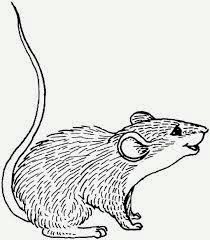 |
| Anna Laetitia Barbould 1743-1825 |
The Romantic Period of British Literature was unique, in that, it brought about new ways of seeing things. There was a deliberate attention given to the diminishing natural world. Focus was now being shifted to individual points of view, and these elements influenced poetry by making it more lyrical in quality.
In most British Literature courses, it begins with Anna Laetitia Barbauld. Barbould was born in 1743, and was educated at home by her mother in Leicestershire, England. In 1772, she married Rochemont Barbould.
 |
| A Little Mouse |
To give the poem context, in the 18th Century, England saw a rise in animal welfare interests. Often, literary scholars view it as the first propaganda piece written in defense of animal rights.
The Mouse's Petition
by Anna Laetitia Barbould
OH ! hear a pensive captive's prayer,
For liberty that sighs;
And never let thine heart be shut
Against the prisoner's cries.
For here forlorn and sad I sit,
Within the wiry grate;
And tremble at th' approaching morn,
Which brings impending fate.
If e'er thy breast with freedom glow'd,
And spurn'd a tyrant's chain,
Let not thy strong oppressive force
A free-born mouse detain.
Oh ! do not stain with guiltless blood
Thy hospitable hearth;
Nor triumph that thy wiles betray'd
A prize so little worth.
The scatter'd gleanings of a feast
My scanty meals supply;
But if thine unrelenting heart
That slender boon deny,
The chearful light, the vital air,
Are blessings widely given;
Let nature's commoners enjoy
The common gifts of heaven.
The well taught philosophic mind
To all compassion gives;
Casts round the world an equal eye,
And feels for all that lives.
If mind, as ancient sages taught,
A never dying flame,
Still shifts thro' matter's varying forms,
In every form the same,
Beware, lest in the worm you crush
A brother's soul you find;
And tremble lest thy luckless hand
Dislodge a kindred mind.
Or, if this transient gleam of day
Be all of life we share,
Let pity plead within thy breast,
That little all to spare.
So may thy hospitable board
With health and peace be crown'd;
And every charm of heartfelt ease
Beneath thy roof be found.
So when unseen destruction lurks,
Which men like mice may share,
May some kind angel clear thy path,
And break the hidden snare.
Analysis:
The narrator of the poem is the mouse who is pleading for his life. We can see that throughout the poem due to the point of view of the narrator.
Stanza seven is significant because the mouse is flattering the scientists wisdom, and thus, manipulating him to see his point of view. By stating that the scientist is so highly intelligent, so therefore, he can see the error of his ways.
In stanza nine, Barbould insinuates if the scientist would hurt this mouse, he would also hurt another human being. This is an obvious usage of the writer's tool called personification, where the writer gives the animal human-like thoughts and feelings.
In stanza 12, Barbould asks her readers to rise in action against animal cruelty.
Come back next week, for more poetry by Anna Laetitia Barbould.
Laurie Epps is a recent graduate of Anderson
University majoring in Creative Writing. Already Laurie is most published as a
feature article writer, essayist, and poet. A seeker of beauty and world
traveler, Laurie hopes to grow into a career in travel writing illuminating the
many stories that make us human despite our differences. Currently, Laurie also
has a Monday Morning Book Club column dedicated to writers everywhere.






No comments:
Post a Comment